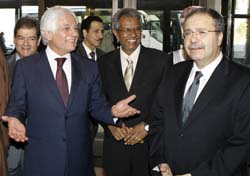 By Nicholas Kimbrell, BEIRUT: Although Syrian-Lebanese relations appear to be improving, they have been complicated by the sparring between the Syrian government and members of Lebanon's ruling March 14 alliance over allegations about the funding of a militant Islamist group, analysts told The Daily Star Monday. Prior to President Michel Sleiman's landmark visit to Syria in mid-August, the two countries had agreed to establish diplomatic relations. In October, Foreign Minister Fawzi Salloukh met with his Syrian counterpart Walid Moallem in Damascus to cement the formalization of ties. Interior Minster Ziyad Baroud traveled to Damascus last week, returning with a bilateral security agreement, and Information Minster Tarek Mitri was received in Damascus Sunday for a joint meeting of the Arab Information Committee. Speaking from Damascus, Mitri called the Syrian-Lebanese relationship "strong," adding that the relationship was based on "mutual respect and common interests."
By Nicholas Kimbrell, BEIRUT: Although Syrian-Lebanese relations appear to be improving, they have been complicated by the sparring between the Syrian government and members of Lebanon's ruling March 14 alliance over allegations about the funding of a militant Islamist group, analysts told The Daily Star Monday. Prior to President Michel Sleiman's landmark visit to Syria in mid-August, the two countries had agreed to establish diplomatic relations. In October, Foreign Minister Fawzi Salloukh met with his Syrian counterpart Walid Moallem in Damascus to cement the formalization of ties. Interior Minster Ziyad Baroud traveled to Damascus last week, returning with a bilateral security agreement, and Information Minster Tarek Mitri was received in Damascus Sunday for a joint meeting of the Arab Information Committee. Speaking from Damascus, Mitri called the Syrian-Lebanese relationship "strong," adding that the relationship was based on "mutual respect and common interests." He noted that Sleiman's visit had paved the way for recent improvements in ties after "passing through a difficult phase." However, residual tensions and recent accusations have led some to question the extent to which the Syrian-Lebanese relationship has improved. Comments by Syrian President Bashar Assad in September warning of the growing extremist threat in Tripoli, followed by the deployment of 10,000 Syrian troops to the Lebanese border, stoked fears in Lebanon of a potential incursion in the North. More recently, Syrian State Television aired a collection of "confessions" from members of the militant Islamist group, Fatah al-Islam, in which certain members claimed to have received funding from March 14 leader Saad Hariri and his Future Movement.
The Mustaqbal daily, a Hariri-owned paper, fired back Saturday with separate testimonies blaming Syria for sponsoring the group, which waged a fierce war against the Lebanese army in and around the Nahr al-Bared refugee camp during the summer of 2007. The battle left hundreds dead, including 168 soldiers, dozens of civilians and over 200 militants.
According to political analysts, the improvement of ties has been complicated by the recent accusations and remains mired in mistrust, dating back to Syria's 30-year dominance of Lebanon.
"It's a little contradictory to try to normalize [relations] while the majority in the government is trying to make a case against Syria," Fadai Kiwan, the director of the school of political science at St. Joseph's University, told The Daily Star.
"The majority of Lebanese still have a problem of trust in the Syrian regime," she added.
But Kiwan did cite recent Syrian-Lebanese collaboration on security, particularly a bilateral effort to combat terrorism, as a positive development.
Concerning the high-profile visits of Lebanese ministers to Damascus this fall, Kiwan cautioned against being too optimistic. "This is a step in the process of normalization but it can't go very far," she said, "because of the lack of trust, particularly of the March 14 group."
Paul Salem, director of the Carnegie Middle East Center, said that Syria is sending "mixed signals."
"I think there is a large question over the direction of the Syrian policy toward Lebanon," he said, citing the importance of US-Syrian and Saudi Arabian-Syrian relations to the Syrian-Lebanese relationship.
Salem noted progress, most notably the establishment of diplomatic relations, but he also spoke of "an escalation of rhetoric," like Assad's comments about North Lebanon and the Fatah al-Islam "confessions" implicating Hariri's Future Movement.
"The visits [of Lebanese ministers] reinforce a trajectory most Lebanese want, but they in themselves do not guarantee future Syrian behavior or policy," Salem said.
MP Michel Aoun, head of the Free Patriotic Movement (FPM) and a former army commander, is also expected to travel to Syria before the end of November - a trip that has caused controversy in Lebanon.
Aoun's FPM is a member of the opposition March 8 alliance, which is pro-Syrian, but in the late 1980s and 1990, before his exile to France, Aoun made a name for himself as one of Syria's staunchest opponents.
Aoun's political allies have called his upcoming trip historic, saying he will be treated like a hero in Damascus.
Kiwan said that Aoun's trip aims to "consolidate an alliance with the East," and secure backing for Lebanese Christians.
According to Kiwan, Aoun, a Maronite Christian, has lost faith in the West, particularly the United States, as being the willing protector of the Christians in Lebanon.
"The Christians have no alliance outside the country," she said, noting that the Sunnis have Saudi support and the Shiites, at least Amal and Hizbullah, have Iranian backing.
Although some Christians have labeled Aoun's forthcoming visit a betrayal, Osama Safa, head of the Lebanese Center for Policy Studies, noted that majority and independent ministers and parliamentarians have come to the realization that stability in Lebanon depends on Syria.
"People have reconciled themselves to the fact [that] stability doesn't come without appeasing the Syrians," Safa said.
Bad relations with Syria, Safa added, would lead Lebanon to "paralysis, if not violence."